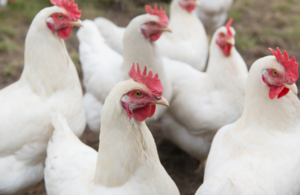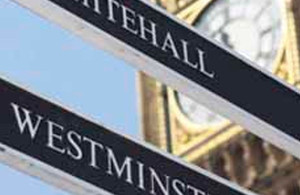Boost for North Yorkshire’s growth as A1(M) junction improvements head towards completion
The £10m project at junction 47 (Allerton Park) involves widening three of the four slip roads onto and off the roundabout to increase capacity as well as a number of junction improvements.
Yesterday, Harrogate and Knaresborough MP Andrew Jones visited the works to get a progress report from North Yorkshire County Council which is delivering the project and National Highways, formerly Highways England, which is part-funding it.
As well as widening the slip roads, traffic signals will be installed on the roundabout to improve traffic flow. Signals will also be added to the T-junction between the A168 and the A59 a short distance from junction 47 on the York side to benefit drivers turning on to the A59 and improve safety.
To the west of Junction 47, between the A1 and the Flaxby roundabout, a lane will be added for traffic travelling east, so there will be two lanes in each direction between those two roundabouts.
Andrew Jones MP with representatives of the project team including North Yorkshire County Council, National Highways and Farrans Construction.
Mr Jones said:
A vital aspect of enabling the levelling up of this area and the wider region is ensuring that the necessary infrastructure is in place to support economic development and the jobs, homes and prosperity that delivers.
I am delighted to see the progress being made on this key junction. This upgrade will strengthen transport connections and enhance resilience, adding an important piece to the jigsaw that will guide sustainable growth in Harrogate and Knaresborough in the coming years.
Simon Boyle, Yorkshire and North East Divisional Director for National Highways, said:
We are delighted to be working with North Yorkshire County Council, York and North Yorkshire Local Enterprise Partnership and developer Forward Investment LLP on this project. Better transport links and improved journey reliability are key to the economic success of an area.
This scheme will unlock future growth to Harrogate and Knaresborough by enabling better movement of people and goods as well as improving traffic flow and safety for local road users. We look forward to its completion.
Cllr Don Mackenzie, Executive Member for Access, said:
These upgrades will address congestion at this location, improve road safety and support sustainable development in Harrogate and Knaresborough. This investment is also vital to address one of the County Council’s top transport priorities, improving east-west connections across North Yorkshire.
The project has been supported by £2.47m from the government’s Local Growth Fund, secured by the York and North Yorkshire Local Enterprise Partnership, along with contributions from the County Council, National Highways and developer Forward Investment LLP. Work is scheduled to be completed in December 2021.
David Dickson, Chair of the York and North Yorkshire Local Enterprise Partnership Infrastructure and Joint Assets Board, said:
Improved connectivity will enable good economic growth for the region. We’re delighted to see the continued progress of this scheme.
The contractor is Farrans Construction and the scheme designer and supervisor is Aecom.
General enquiries
Members of the public should contact the National Highways customer contact centre on 0300 123 5000.
Media enquiries
Journalists should contact the National Highways press office on 0844 693 1448 and use the menu to speak to the most appropriate press officer.


